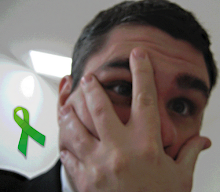...by my third day I began to notice how effortlessly my soft-spoken Matt-mannequin was going through his robotic motions of praise, and I was shocked. For a brief, fleeting moment I could see how under different circumstances it would be easy enough to bury your "sinful" self far under the skin of your outer Christian and to just travel through life this way. So long as you go through all the motions, no one will care who you really are underneath. And besides, so long as you are going through all the motions, never breaking the facade, who are you really? It was an incomplete thought, but it was a scary one; it was the very first time I worried that the experience of entering this world might prove to be anything more than an unusually tiring assignment. I feared for my normal.
Like American Psycho before him
There is a sense that as long as you say and do what is expected of you, you are one of the chosen and the happy. I remember reading that the Puritans all acted happy even when miserable because they didn't want the others to know they hadn't been saved. The Lord had not revealed their pre-selection for Paradise. If Biddy Jones was really saved, why was she so sad? Goodman Smith must be saved, look how happy he is....
- Bryce: He makes himself out to be a harmless old codger, but inside... inside...
- Bateman: [voice-over] ..."but inside" doesn't matter.
Why do people do it? Why do they make mechanical their lives?
It's that once you've gotten to this place, you've left behind the mental process that a person would need to form an independent opinion about such things. You make this journey precisely to experience the ecstasy of beating to the same big gristly heart with a roomful of like-minded folks. Once you reach that place with them, you're thinking with muscles, not neurons.They, do it, we do it, I do it, because we want to belong, we want to not have to think our own thoughts. We do it because we watch American Idol. We do it because we would prefer a comedy to a drama. We do it because we are tired, just tired of trying at everything. Those that can do, those that can't... believe.
